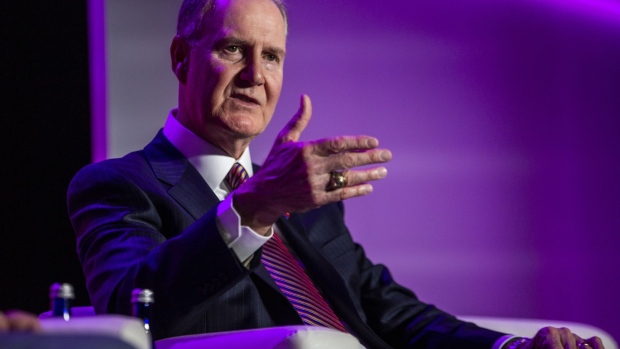Jan 29, 2022
Airlines Anxiously Await Road Warrior Return to Office and Air
, Bloomberg News

(Bloomberg) -- Two years into the pandemic and the airline industry remains on standby for the return of business travelers.
Expectations that expense account-wielding road warriors would follow on the heels of leisure travelers have yet to materialize, and the outlook remains hazy with the spread of the latest coronavirus variant. That’s kept carriers’ profits in check and raised questions over whether the change is just a cyclical blip or a structural deviation.
Southwest Airlines Co.’s top executive rued the slow rebound in business travel in an earnings call on Thursday and hinted the pace of recovery may continue to be slower than some industry veterans anticipated a year ago.
“I thought we would have this pandemic beat and far behind us, and it’s far from that,” Chief Executive Officer Gary Kelly told analysts and reporters. He said the lingering impact of the pandemic will likely mean fewer business passengers for a longer span. “We’re going to have to be more heavily dependent on consumer travel than we were before.”
Business travel is critical to large airlines, who rely on those flyers to fill premium-class seats and pay higher fares for trips booked on short notice. Airlines for America, the lobbying group for the biggest U.S. carriers, says weekly tickets sold for corporate travel remain 63% below pre-pandemic levels. The U.S. Travel Association forecasts that U.S. business travel spending and the number of trips won’t top 2019 levels until 2024.
American Airlines Group Inc. expects a return of business demand -- but is hedging its bets.
“As we’re developing our plans and forecast for this year, we’re working to build an airline that can be profitable even without the full return of managed corporate travel,” CEO Robert Isom said on a conference call earlier this month, referring to large accounts where trips are booked by an outside vendor.
Close Scrutiny
Companies have been slow to resume business trips as their return-to-office plans are pushed back and employees have come to rely on -- and even embrace -- video conferences instead of face-to-face meetings. That’s raised anew the question of whether corporate America will resume its old ways or retain the cost and time savings.
A 2022 travel outlook report by Deloitte concluded corporate travel this year is unlikely to reach or near 2019 levels even assuming the best possible Covid-19 outcomes. And company executives “will likely continue to closely scrutinize travel spend and return on investment after operating successfully with so few trips,” the report said.
Southwest has recovered about 50% of its pre-pandemic business travel revenue. “I definitely think it will recover from here,” Kelly told CNBC Thursday. “How fast it will recover is anybody’s guess.”
Frustrated executives have had to readjust their outlooks repeatedly as new coronavirus mutations such as the omicron variant wreak havoc on bookings and schedules. Scott Kirby, CEO of United Airlines Holdings Inc., said his managers gave up on forecasting short-term demand “because we haven’t been very good at it.”
Economy Seat Battle
The absence of business travelers -- most notably for high-margin international routes -- has forced airlines to compete more fiercely for leisure passengers. American, Delta Air Lines Inc. and United all are focused on the North American market as they anxiously await the end of travel restrictions globally.
“Consumer travel has consistently bounced back faster and stronger than business,” said Samuel Engel, senior vice president of the aviation group at consultant ICF. “Zoom may be a substitute for a business meeting, but it will never give you a hug from grandma.”
Read more: Hybrid Work-Fun Trips Help Fill Airline Seats as Business Lags
Three of the big four airlines are forecasting a return to profit this year from the second quarter forward, due in part to the resumption of corporate travel as workers move back to offices and to looser travel restrictions. American Airlines said it would resume making money later this year, without specifying a time frame.
Delta CEO Ed Bastian accentuated the positive earlier this month, saying the omicron variant derailed a domestic business recovery that should regain momentum over the next 60 to 90 days. “They’re just waiting for the all-clear sign that you don’t have to worry” about variants while traveling, he said.
But even that may not be prelude to a full return to pre-pandemic business as usual. Bastian previously has forecast that a portion of corporate travel may never return.
©2022 Bloomberg L.P.